
AMERICAN JOURNAL OF BIOETHICS
Scope & Guideline
Elevating bioethical standards in health and medicine.
Introduction
Aims and Scopes
- Ethical Implications of Emerging Technologies:
The journal extensively covers the ethical challenges posed by new technologies such as artificial intelligence, machine learning, and gene editing, focusing on how these innovations affect patient care and ethical standards in medical practice. - Health Equity and Social Justice:
A significant focus is placed on issues of health equity and social justice, particularly how systemic racism and social determinants impact healthcare access and outcomes for marginalized populations. - Patient Autonomy and Informed Consent:
The journal emphasizes the importance of patient autonomy, informed consent, and the ethical considerations surrounding decision-making capacity, especially in vulnerable populations. - Interdisciplinary Approaches:
The journal encourages interdisciplinary dialogue, integrating perspectives from philosophy, law, public health, and social sciences to enrich the discourse on bioethical issues. - Crisis and Emergency Ethics:
The journal addresses ethical challenges during public health crises, such as the COVID-19 pandemic, focusing on resource allocation, triage, and the ethical implications of emergency measures.
Trending and Emerging
- Intersectionality and Health Disparities:
A growing trend is the emphasis on intersectionality, exploring how multiple identities (e.g., race, gender, disability) intersect to create unique health disparities and ethical challenges in healthcare. - Environmental Justice in Bioethics:
There is an emerging focus on environmental justice and its implications for health equity, particularly how environmental factors contribute to health disparities and ethical considerations in public health. - Technology and Data Ethics:
The journal increasingly addresses the ethical implications of data use in healthcare, including privacy concerns, algorithmic bias, and the ethical responsibilities of researchers and practitioners in managing patient data. - Community Engagement and Participatory Ethics:
Emerging themes include community engagement and participatory ethics, where the voices of marginalized communities are prioritized in ethical discussions and decision-making processes. - Global Health Ethics:
An increasing number of publications are dedicated to global health ethics, addressing ethical dilemmas in international health contexts and the responsibilities of global actors in promoting health equity.
Declining or Waning
- Traditional Medical Ethics Frameworks:
There appears to be a waning focus on classical medical ethics frameworks, such as principlism (autonomy, beneficence, non-maleficence, and justice), as discussions increasingly center around contextual and relational ethics that address the complexities of real-world situations. - Philosophical Debates on Personhood:
The exploration of personhood and its implications in bioethics has diminished, with more emphasis now placed on practical applications and the lived experiences of individuals rather than theoretical philosophical debates. - Individualistic Approaches to Ethics:
The journal has seen a decline in articles promoting strictly individualistic approaches to bioethics, with a shift towards collective and community-oriented perspectives that consider broader societal impacts.
Similar Journals
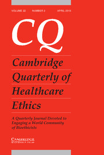
CAMBRIDGE QUARTERLY OF HEALTHCARE ETHICS
Engaging Scholars in Vital Ethical Conversations.CAMBRIDGE QUARTERLY OF HEALTHCARE ETHICS is a premier journal published by Cambridge University Press, focusing on significant issues at the intersection of healthcare, ethics, and policy. With an ISSN of 0963-1801 and an E-ISSN of 1469-2147, this journal serves as a vital platform for discourse among researchers, practitioners, and scholars in the health social sciences. Emphasizing vital ethical considerations in healthcare practices and policies, it ranks in the Q3 tier for Health Policy and Q2 for both Health (Social Science) and Issues, Ethics, and Legal Aspects according to the 2023 journal category quartiles. The journal, spanning its tenure from 1992 to 2024, features rigorous peer-reviewed articles that contribute to the advancement of ethical standards in healthcare. By addressing contemporary ethical dilemmas and promoting scholarly dialogue, CAMBRIDGE QUARTERLY OF HEALTHCARE ETHICS remains an essential resource for those committed to understanding the complexities and ethical implications inherent in health systems today.

New Bioethics-A Multidisciplinary Journal of Biotechnology and the Body
Advancing Understanding of Biotechnology's Impact on HumanityNew Bioethics: A Multidisciplinary Journal of Biotechnology and the Body, published by Taylor & Francis Ltd, serves as a pivotal platform for scholarly discourse at the intersection of biotechnology, health policy, and bioethics. With an ISSN of 2050-2877 and E-ISSN 2050-2885, this journal has been contributing to the academic community since its establishment in 2012 and is set to continue through 2024. It holds notable rankings in prestigious fields, including Q4 in Genetics (clinical), Q3 in Health Policy, Q2 in Issues, Ethics and Legal Aspects, and Q3 in Reproductive Medicine as per 2023 quartile indicators. Although no open access model is available, the journal remains an essential resource for those interested in the ethical implications of biotechnological advancements. Its focus on the ethical, legal, and social dimensions of biotechnology is particularly relevant in today's rapidly evolving scientific landscape, making it invaluable for researchers, professionals, and students keen to explore the complexities surrounding the biotechnology and the human condition.

Cuadernos de Bioetica
Empowering Ethical Decision-Making in MedicineCuadernos de Bioetica, published by the ASOC ESPANOLA BIOETICA & ETICA MEDICA, is a prominent academic journal dedicated to exploring significant philosophical, ethical, and legal dimensions within the field of bioethics. With an ISSN of 1132-1989 and an E-ISSN of 2386-3773, this journal serves as a vital platform for researchers, professionals, and students in medicine and related disciplines. Since its inception in 2008, it has consistently provided critical analyses and discussions reflecting the evolving landscape of healthcare ethics, contributing notably to the discourse surrounding ethical practices in medicine. Despite its current Q4 ranking in the miscellaneous medicine category, Cuadernos de Bioetica is committed to enhancing its impact and relevance, making it an essential resource for those seeking to navigate the complex ethical challenges in contemporary medical practice. The journal’s reach is underscored by its commitment to fostering open dialogue among diverse stakeholders in the field, encouraging a broad spectrum of contributions to advance knowledge in bioethics.

THEORETICAL MEDICINE AND BIOETHICS
Pioneering Research at the Crossroads of Ethics and Medicine.THEORETICAL MEDICINE AND BIOETHICS, published by SPRINGER, is an esteemed journal dedicated to exploring the complex intersections of medicine, ethics, and law. With its ISSN 1386-7415 and E-ISSN 1573-1200, this journal serves as a vital platform for scholars, practitioners, and students interested in the ethical implications of medical practices and innovations. Although it currently holds a Q4 impact factor in the categories of Issues, Ethics and Legal Aspects and Medicine (Miscellaneous) as of 2023, its relevance is amplified by its commitment to fostering critical discourse in a rapidly evolving field. The journal features a diverse range of articles that address profound ethical dilemmas in healthcare, making it a significant resource for contemporary research from 1997 to the present. As an open-access journal, it ensures that cutting-edge knowledge is readily available, inviting contributions that challenge conventional thought and advance the field of bioethics.
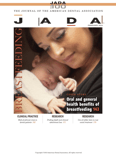
JOURNAL OF THE AMERICAN DENTAL ASSOCIATION
Discovering New Frontiers in Oral Health ResearchJournal of the American Dental Association (JADA) is a premier, peer-reviewed publication in the field of dentistry and medicine, published by the American Dental Association. Established in 1946, JADA has become a cornerstone of dental research and education, providing an invaluable resource for professionals, researchers, and students alike. With an impressive impact factor that places it in the Q2 quartile in both Dentistry and Medicine, it ranks among the top journals in general dentistry, occupying the 23rd position out of 132 in its category with an impressive 82nd percentile in Scopus rankings. JADA is committed to the dissemination of high-quality, clinically relevant research aimed at advancing oral health and providing practitioners with the necessary tools to improve patient care. While not an Open Access journal, it offers a wealth of resources and insights that can significantly contribute to the development of evidence-based practices. With its long-standing heritage and unwavering focus on innovation in dental care, JADA is essential reading for anyone involved in the dental profession.
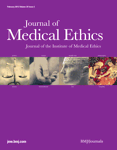
JOURNAL OF MEDICAL ETHICS
Championing Ethical Standards in MedicineJOURNAL OF MEDICAL ETHICS, published by the esteemed BMJ PUBLISHING GROUP, is a leading journal that has been pivotal in advancing the discourse on ethical issues in healthcare since its inception in 1975. This UK-based journal, with an ISSN of 0306-6800 and an E-ISSN of 1473-4257, is well-regarded for its high-quality, peer-reviewed articles that delve into the complex moral dimensions surrounding medical practices, health policies, and social sciences. With a commendable impact, JOURNAL OF MEDICAL ETHICS has achieved Q1 quartile rankings across multiple categories, including Arts and Humanities and Health Policy in 2023, reflecting its significant influence and relevance in the field—ranked #23 of 552 in Arts and Humanities (Miscellaneous) with a 95th percentile, and #26 in Health Policy with a 91st percentile. Researchers, professionals, and students alike can benefit from the journal's commitment to fostering a deeper understanding of ethical considerations vital to the medical community, although it currently does not offer open access options. The journal's comprehensive examination of issues, ethics, and legal aspects continues to make it an essential resource for those dedicated to shaping the ethical landscape of healthcare.
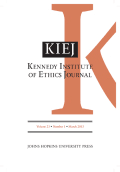
KENNEDY INSTITUTE OF ETHICS JOURNAL
Cultivating Critical Thought in Ethics and Health PolicyThe KENNEDY INSTITUTE OF ETHICS JOURNAL, published by the prestigious Johns Hopkins University Press, stands as a leading periodical in the realm of ethics, particularly emphasizing the intersection of health policy, social sciences, history, and philosophy of science. With an ISSN of 1054-6863 and an E-ISSN of 1086-3249, this journal has been a cornerstone of ethical discourse since its inception in 1991. Renowned for its rigorous peer-review process, the journal boasts impressive rankings, including Q1 in History and Philosophy of Science and Q2 in Health (Social Science) for 2023. Researchers, professionals, and students alike will find this journal invaluable for navigating complex ethical issues, providing a platform for innovative research and discourse. Although currently not offering Open Access, its contributions to the fields of ethics and legal aspects of health are profound, making it an essential resource for those engaged in these critical discussions.
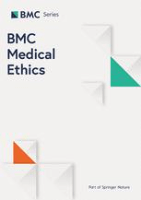
BMC Medical Ethics
Fostering collaboration on critical healthcare issues.BMC Medical Ethics is a leading open-access journal dedicated to the critical exploration and dissemination of knowledge surrounding ethical issues in healthcare and medicine. Published by BMC, and headquartered in the United Kingdom, this journal has become a cornerstone in the field since its inception in 2000, with a remarkable focus on health policy, nursing ethics, and the complex legal aspects intertwining with healthcare practices. With an impressive Q1 ranking across multiple categories, including Health Policy and Health (Social Science), it ranks among the top journals globally—particularly notable with its Scopus rankings reflecting a strong 85th percentile in Nursing and an 81st percentile in Social Sciences. As an open-access publication, BMC Medical Ethics ensures that research findings are readily accessible, fostering a collaborative environment for researchers, practitioners, and students alike. The journal's commitment to ethical discourse not only advances academic inquiry but also shapes the practices and policies that govern healthcare delivery; thus, making it an invaluable resource for those engaged in the advancement of medical ethics.
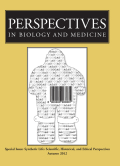
PERSPECTIVES IN BIOLOGY AND MEDICINE
Navigating the Nexus of Science and Health PolicyPERSPECTIVES IN BIOLOGY AND MEDICINE, published by the esteemed Johns Hopkins University Press, has been a cornerstone of interdisciplinary dialogue since its inception in 1957. With a rich history spanning over six decades, this journal delves into the multifaceted interactions between biology and medicine, offering insights that are vital for health policy, ethics, and the philosophy of science. Recognized for its impact, it holds a Q2 ranking in the History and Philosophy of Science category and Q3 rankings in several other relevant fields as of 2023. While not an open-access publication, it provides critical analyses and discussions that are indispensable for researchers, professionals, and students alike. With its committed editorial team, PERSPECTIVES IN BIOLOGY AND MEDICINE continues to foster scholarly engagement and is poised to shape the future discourse in the biosciences.
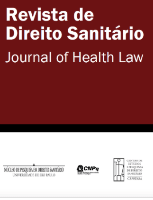
Revista de Direito Sanitario-Journal of Health Law
Transforming Health Law Discourse GloballyRevista de Direito Sanitario-Journal of Health Law is a prominent academic publication in the field of health law, published by the esteemed University of São Paulo (UNIV SAO PAULO), Brazil. With a focus on the intersection of law and public health, this Open Access journal has been disseminating vital research since its inception in 2013, allowing for wide accessibility and engagement from scholars and practitioners alike. The journal serves as a critical forum for advancing discussions on health-related legal issues, policy implications, and regulatory frameworks. While currently positioned in the fourth quartile in health (social science) and medicine (miscellaneous), and the third quartile in law, its acceptance and visibility continue to grow within the global academic community. The insights shared in this journal are invaluable for those striving to enhance legal practice and health policy, making it an indispensable resource for researchers, professionals, and students committed to the advancement of health law and its implications in society.